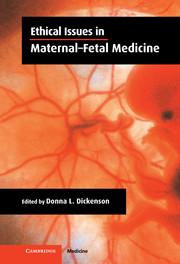Book contents
- Frontmatter
- Contents
- List of contributors
- Acknowledgements
- 1 Introduction: recent debates in maternal–fetal medicine – what are the ethical questions?
- 2 Overview: a framework for reproductive ethics
- I GENERIC ISSUES IN PREGNANCY
- II INCEPTION OF PREGNANCY: NEW REPRODUCTIVE TECHNOLOGIES
- III FIRST AND SECOND TRIMESTER
- IV THIRD TRIMESTER
- V NEONATAL LIFE
- Index
2 - Overview: a framework for reproductive ethics
Published online by Cambridge University Press: 29 September 2009
- Frontmatter
- Contents
- List of contributors
- Acknowledgements
- 1 Introduction: recent debates in maternal–fetal medicine – what are the ethical questions?
- 2 Overview: a framework for reproductive ethics
- I GENERIC ISSUES IN PREGNANCY
- II INCEPTION OF PREGNANCY: NEW REPRODUCTIVE TECHNOLOGIES
- III FIRST AND SECOND TRIMESTER
- IV THIRD TRIMESTER
- V NEONATAL LIFE
- Index
Summary
Medical professionals now face a growing number of controversial issues involving human reproduction. To illustrate the variety of issues, consider the following three scenarios. In the first case, involving a pregnant woman at 36 weeks of gestation, the obstetrician believed there was placental insufficiency, a condition in which the fetus was not getting enough oxygen. The doctor recommended Caesarean delivery for the fetus's sake, but the woman refused the Caesarean, stating that she was putting her faith in God that everything would turn out well. At that point, the physician considered seeking a court order authorizing surgical delivery without the woman's consent (In Re Baby Boy Doe, 1994). This case raises important questions. What is the moral standing of the fetus, particularly the fetus that is relatively advanced in gestation? What reasons can be given in support of assigning priority to the woman's wishes? Are there cases in which refusal of treatment by pregnant women may be justifiably overridden?
In another case, a research team was attempting to learn how to mature ova in vitro. In normal reproduction, ova undergo a maturation process that prepares them for fertilization, but the process is not well understood. If ova could be matured in vitro, then new sources of ova for assisted reproduction would be available. For example, ova could be obtained from donors whose ovaries have been removed as part of therapeutic surgical procedures. In that event, donors would not have to receive hyperstimulation drugs, which can have adverse side effects.
- Type
- Chapter
- Information
- Ethical Issues in Maternal-Fetal Medicine , pp. 17 - 36Publisher: Cambridge University PressPrint publication year: 2002
- 5
- Cited by

